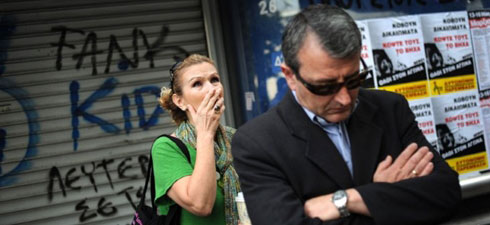The deceased were victims of a "crime that is being blamed on the Greek people" headlines To Ethnos, which stresses that this act “mars the country’s image abroad” and will have a “huge impact on tourism in Greece and the Greek economy". Another Greek daily, Eleftherotypia, argues that “it was the unfairness" of the austerity measures that inflamed the demonstrators, for the most part young members of "Generation €595” – so-called because the “austerity drive is turning Generation €700 into a G595". "An agonising future lies in store” for them, a generation of young people who already took to the streets in late 2008 to protest against the economic insecurity to which they feel condemned, who “don’t believe the promises and don’t trust the parties or the politicians”, and who are “brimming with bitterness and frustration", adds Eleftherotypia.
These deaths are pushing Greece down “the road to destruction”, headlines Kathimerini, quoting Greek president Carolos Papoulias’ reaction to the news of the three fatalities at Marfin Egnatia Bank. The Greek daily points out that they “were the first to perish in such circumstances since 1991, when four people died in a blaze in a central Athens building”. "Papoulias is not exaggerating", concurs To Vima, proclaiming that the incident "reminds everyone – inside and outside parliament – that History will pass judgment on us". "The Greek tragedy was still making headlines in yesterday’s world news,” observes the daily: "The three bankers’ deaths have rekindled fears of unbridled violence in the country. There’s no telling what will happen now.” But “one thing is for sure”, continues To Vima: “Our innocence is gone. And in the end no-one can be unaware of where such conduct leads.”
Greeks have sent a clear-cut message
“Can a society self-destruct?" asks Kathimerini. "Yes, it most definitely can and the way Greece is headed right now there is a very real possibility that it will.[…] We see a society that is mad, and justifiably so, and we see it going down an ill-advised path”, led by a panic-stricken government that is rousing the populist fever and adding fuel to the flames.
As to its future, "Greece is at the most crucial point [in] its post-1974 history”, Kathimerini continues, “and whether we destroy ourselves or not, whether we go bankrupt or not, depends not just on our political leadership, but also on every single one of us individually and collectively.” To Ethnos feels "the Greeks have sent a clear-cut message" to a government that is “on the brink of a political crisis". Still and all, however, yesterday’s events have not sufficed to “lay the foundations for a minimum consensus among the prevailing political forces to take on the economic crisis”, bemoans Ta Nea, presaging that, absent consensus, the country is headed straight for “disaster”.
Was this article useful? If so we are delighted!
It is freely available because we believe that the right to free and independent information is essential for democracy. But this right is not guaranteed forever, and independence comes at a cost. We need your support in order to continue publishing independent, multilingual news for all Europeans.
Discover our subscription offers and their exclusive benefits and become a member of our community now!












